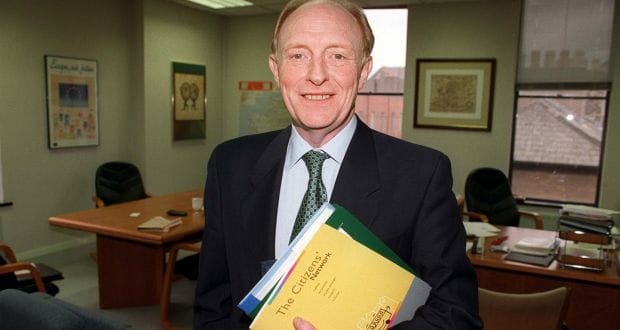Neil Kinnock: Labour’s Reformist Leader Ponders the Road Back to Power

By Joe Greaney – MA Music in Development
On a cold February morning, Neil Kinnock sits in the living room of his North London home with his wife, Glenys. Two months previously, the 2019 General Election saw the Labour Party’s number of MPs reduced to just 203, its lowest total since 1935. Meanwhile, in a leadership contest that the UK media is already bored of, his party is fighting for relevance as it prepares for at least five more years in opposition.
A staunch critic of Jeremy Corbyn’s leadership, Kinnock is not hesitant to state Labour’s defeat was brought on, at least in part, by the influence of senior Labour figures who were ‘more interested in campaigning than winning’. He laments the party’s inability to broaden its appeal but advises against labelling any part of the Corbyn project ‘stupid or deluded’. He does however, suggest that Labour is in serious danger of forgetting how to win power, and of being ‘perpetual mourners at the funerals of communities and industries’.
Kinnock categorically refutes that the British press were wholly, or even substantially to blame for Labour’s defeat. Despite his own experience of press attacks, he compares blaming the media environment to ‘sailors complaining about the sea’, drawing reluctantly on the words of Enoch Powell. Kinnock’s thoughts turn to Tony Blair’s relationship with the tabloids, and remarks Blair was prepared ‘to have lunch with people I wouldn’t share a room with,’ in a thinly veiled nod to Blair’s attempts in 1995 to court the support of Rupert Murdoch, which he criticised at the time. Kinnock adds, perhaps reflecting on The Sun coming out for Labour in its landslide 1997 General Election victory, ‘that was probably right.’
So what next? Kinnock believes Labour’s approach must be realistic, ‘The first thing you do as a socialist, is to explain what you mean by socialism.’ He insists that socialism is still a ‘fundamentally practical creed’ and that Labour’s support is strongest when it is seen as ‘tangible and vital’.
He considers the real-life implications of 10 years of Conservative Government in 2020. Social housing and access to affordable housing, which he describes as ‘fundamental to everything else’, is in crisis due to local authority funding shortfalls and stuttering construction figures. Kinnock was raised in a prefab council house, and observes the ‘security’ that ‘decent” housing provided for him. He nods to Nye Bevan, perhaps his greatest political influence, who he notes built 250,000 council houses a year as Housing Minister in the post-war Labour Government.
As Leader, Kinnock presided over the re-marketing of Labour, a process most famously remembered in the adoption of the current Rose logo, but more fundamentally in its study of voter opinion. Labour employed focus group specialist Philip Gould, Communications Chief Peter Mandelson, and advertising agency IBM, to transform the party’s image.
Despite the influence of Mandelson, and Labour’s changing positions on issues such as nuclear disarmament under his leadership, Kinnock still proudly speaks the language of 1970s socialism, referring to ‘comrades’ past and present. Although he ‘saw the advantage’ of making Labour more managerial in presentation, Kinnock berates the timidity of some Labour MPs, perhaps cowed by the experience of election failure: ‘For the past 20 years people on the left in our country have become wary of using assertive, colourful language to explain their beliefs because of the amount of derision that was pumped out against people like me.’ Kinnock says some ‘socialist politicians’ need reminding that they should speak with ‘reality, vigour, and audacity’. He says his own gift for oratory came from his attendance at the Methodist Chapel in Tredegar, South Wales. There, he observed ‘ordinary’ people communicating their own reality, and ‘how society should be organised’. This he says, taught him to ‘paint pictures for people’, and to ‘never be afraid of language.’
The next Labour leader will take a job that is sometimes ‘appalling’, Kinnock notes, recalling the impact it had on his friend, and mentor, Michael Foot. His tone softens at the memory of his run for Leader and Foot’s successor, ‘I didn’t particularly want to do it, I have to say. It’s just that I had to, that’s all, simple as that.’
It is fair to say that Kinnock did not regret his bid for the leadership. It remains to be seen whether Labour’s next leader will look back as fondly.



